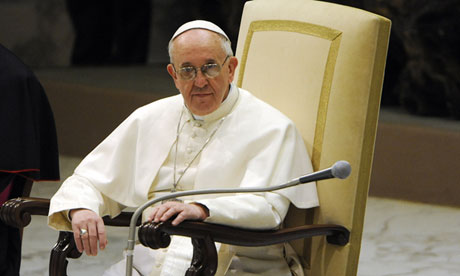During his general audience this morning the Holy Father dedicated his catechesis to Psalm 126 which, he said, “celebrates the great things which the Lord has done for His people, and which He continues to do for all believers”.
The Psalm “speaks of ‘restored fortunes'”, the Pope explained, “in other words, fortunes restored to their original state”. This was the experience of the People of Israel when they returned to their homeland after the Babylonian exile, which had been such a devastating experience not only in political and social terms but also from a religious and spiritual point of view.
“Divine intervention often takes unexpected forms which go beyond what man might expect. … God works marvels in the history of mankind. … He reveals Himself as the powerful and merciful Lord, the refuge of the oppressed Who does not ignore the cry of the poor. … Thus, with the liberation of the People of Israel, everyone recognises the great and wondrous things God has done for His People and celebrates the Lord as Saviour”.
However, the Holy Father went on, “the Psalm goes beyond the purely historical and opens to a broader, theological dimension”. It uses images which “allude to the mysterious truth of redemption, in which the gift we have received and the gift we await, life and death, intertwine”.
The watercourses of the Neg’eb symbolise divine intervention which, like water, “is capable of transforming the desert into a vast expanse of green grass and flowers”, the Pope explained. Later the Psalm also uses the image of peasants cultivating their fields “to speak of salvation. The reference here is to the annual cycle of agriculture: the difficult and arduous time of sowing then the overriding joy of the harvest. … The seed sprouts and grows”.
“This is the hidden mystery of life, these are the ‘great and wondrous things of salvation which the Lord achieves in the history of mankind, but the secret of which is unknown to man. Divine intervention, when fully expressed, has an overpowering dimension, like the watercourses of the Neg’eb and the grain in the fields. This latter image also evokes the disproportion typical of the things of God: disproportion between the fatigue of sowing and the immense joy of the harvest”.
“The Psalmist refers to all these things to speak of salvation. … The deportation to Babylon, like other situations of suffering and crisis, …
with its doubts and the apparent distance from God is, in reality, … like a seedbed. In the mystery of Christ and in the light of the New Testament, the message becomes even clearer and more explicit: the believer who passes through the darkness is like the seed of grain that falls to earth and dies, but brings forth much fruit”.
“This Psalm teaches us that … we must remain hopeful and firm in our faith in God. Our history, though often marked by suffering, uncertainty and moments of crisis, is a history of salvation and ‘restoration of fortunes’.
In Jesus our exile ends: … in the mystery of His cross, in death transformed into life, like the seed which splits in the earth and becomes an ear of wheat”.





